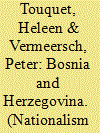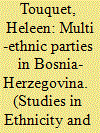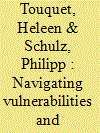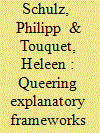| Srl | Item |
| 1 |
ID:
082358


|
|
|
|
|
| Publication |
2008.
|
| Summary/Abstract |
This essay seeks to move beyond the traditional discussions on state change in Bosnia-Herzegovina by assessing the usefulness of shifting attention away from state- and institution-building efforts by domestic or international political elites and by focusing instead on the actions of local nonstate actors. We advocate a theoretical investigation into what might be gained from devoting new scholarly attention to identity-forming processes at the sidelines of governmental politics. We add empirical support to our argument by analyzing the work of a number of organizations in Bosnia that mobilize Bosnian citizens along nonethnic lines and construct alternative state-building narratives
|
|
|
|
|
|
|
|
|
|
|
|
|
|
|
|
| 2 |
ID:
109083


|
|
|
|
|
| Publication |
2011.
|
| Summary/Abstract |
To what extent is political mobilisation across ethnic boundaries possible in states with highly ethnicised state structures? This article explores the opportunities and obstacles that activists in Bosnia-Herzegovina meet when they seek to develop integrative discourses as a basis for political action. The first part of the article focuses on the role of multi-ethnic parties in deeply divided societies. The second part develops alternative ideas on the obstacles facing multi-ethnic parties in Bosnia, focusing on the case of Naša Stranka, a political party that was established by civil society actors. There are two conclusions to be drawn. First, despite the centrifugal nationalisms that seem to dominate the top political level, there are civil society actors in Bosnia who engage in integrative political mobilisation. Second, these actors face difficulties that go beyond the often-cited problem of the tendency of the constitutional state structure to reify ethnic identities.
|
|
|
|
|
|
|
|
|
|
|
|
|
|
|
|
| 3 |
ID:
178341


|
|
|
|
|
| Summary/Abstract |
In dominant global conceptions of conflict-related sexual violence, the experiences of male survivors, if attended to at all, have thus far almost exclusively been analysed in terms of vulnerabilities. Drawing on empirical evidence from two different cases (Uganda and Croatia), in this article we argue that essentializing and static generalizations of ‘emasculation’ fail to do justice to the complexity of male survivors’ experiences. We show that, in the two cases we examine, male survivors exercise agency and find different ways of engaging with their harmful experiences. Survivors’ agency is shaped and conditioned by different opportunity structures, and thus largely dependent on local gender relations and constructions of masculinity. To build our argument, we take inspiration from feminist international relations scholarship highlighting the active roles of women and girls as agents within the context of armed conflict, extending such analysis to the experiences of male survivors of sexual violence. By systematically analysing the forms and conditions of the agency of male survivors of sexual violence, we offer a more holistic examination of the dynamics of wartime sexual violence, contributing conceptually and empirically to research both on local/civilian agency in wartime and on conflict-related sexual violence.
|
|
|
|
|
|
|
|
|
|
|
|
|
|
|
|
| 4 |
ID:
137953


|
|
|
|
|
| Summary/Abstract |
How do groups mobilise around non-ethnic issues in deeply divided societies and cities? This article seeks to answer this question by offering a close reading of one particular exemplary episode in the recent history of post-conflict Bosnia & Herzegovina: the 2008 Sarajevo protests. Sarajevans took to the streets to demand more security in the wake of the murder of a young boy on a tram. The article analyses the framings used by the mobilising social movements in depth, exploring in detail the connections with the local cultural environment, as well as the demobilising authorities’ counter-frames.
|
|
|
|
|
|
|
|
|
|
|
|
|
|
|
|
| 5 |
ID:
174630


|
|
|
|
|
| Summary/Abstract |
In this article we argue that prevalent explanatory frameworks of sexual violence against men primarily pursue one line of inquiry, explaining its occurrence as exclusively strategic and systematic, based on heteronormative and homophobic assumptions about violence, gender and sexualities. Feminist IR scholarship has significantly complexified our understanding of conflict-related sexual violence (CRSV), documenting its multiple forms and causes across time and space—thereby moving beyond the persistent opportunism-strategy dichotomy and critically engaging with the dominant ‘rape as a weapon of war’ narrative. Drawing on empirical material from Sri Lanka and northern Uganda we queer the current explanatory frameworks, analyzing multiple instances of CRSV against men that both simultaneously seem to confirm and defy categorizations as opportunistic or strategic, while being situated in broader and systematic warfare dynamics and unequal power-relationships. Our empirical material shows that relying on crude categorizations such as the opportunism–strategy binary is unproductive and essentialist, as it tends to mask over the complexities and messiness of deeply gendered power relationships during times of war. Binary strategy/opportunism categorizations also imply broader unintended political consequences, including the further marginalization of sexual violence acts that fall outside the dominant scripts or binary frameworks—such as sexual violence against men with opportunistic underpinnings.
|
|
|
|
|
|
|
|
|
|
|
|
|
|
|
|